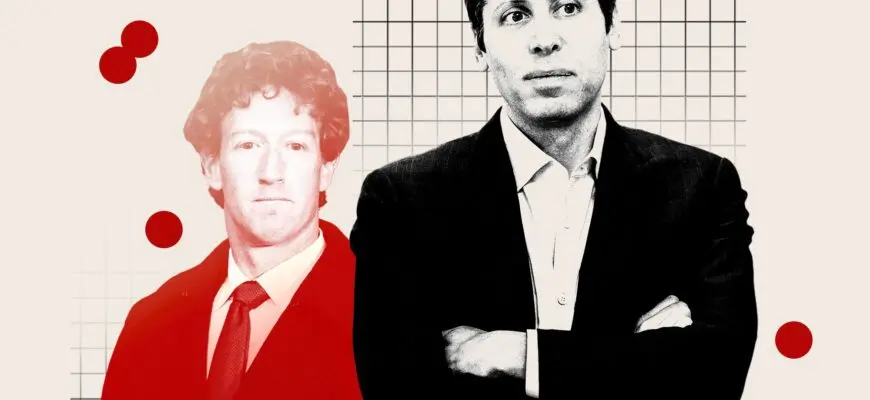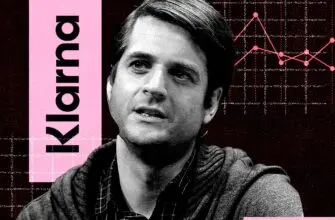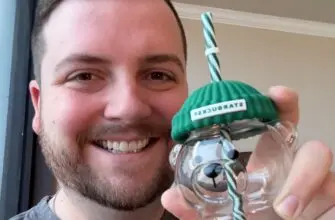The era of social media, defined by Mark Zuckerberg and the curation of digital identity, is giving way to the age of generative AI, where Sam Altman’s tools are increasingly shaping and creating human intention, action, and reality itself.
In a 2009 interview, a 25-year-old Mark Zuckerberg offered a grand prognosis on the human condition. “You have one identity,” the Facebook founder said, adding that having dual identities was “an example of a lack of integrity.” At the time, his five-year-old social network was shaping the identities of more than 350 million people. Like Steve Jobs and the Google founders before him, Zuckerberg was becoming something of the world’s new Minister of Thought, influencing how humans conceived of themselves and one another.
Today, 16 years and arguably several public identities later—from the hoodie-wearing “wunderkind” to the suit-wearing presidential prospect—Zuckerberg is starting to cede that title to Sam Altman, who is shaping human cognition on perhaps an even grander scale.
ChatGPT, just three years old, has more than 800 million weekly users, at least 40 times Facebook’s audience at the same age. OpenAI is now the most valuable private company worldwide. Ten percent of the world’s adults use its flagship chatbot monthly for everything from writing emails and planning trips to decoding medical mysteries and finding love. If Zuckerberg taught the world to post, Altman teaches us to prompt. If the past twenty years were about curating who we are, the next may be about creating who we want to be.
Facebook rewired how we see ourselves and each other. Posts, pokes, photos, and likes stitched together a specific digital avatar. Instagram gave us filters, and the feed’s ranking systems rewarded the “glossiest slice of life.” While Zuckerberg promised to “bring the world closer together,” he didn’t promise we’d show up unvarnished.
Altman’s world is about generation, not just presentation. Filters that boost saturation are being supplanted by “Ghiblified” photo edits. Sora allows users to turn rough ideas into hyperreal videos—whether casting oneself in a fake space opera or watching Mark Cuban tap dance with the late Ginger Rogers. These tools don’t polish reality so much as draft entirely new versions of it.
The appeal of this generation is already clear in personal life. When the author’s husband confessed to using ChatGPT to select a surprisingly perfect birthday gift, the moment felt both endearing and unsettling. If a bot is co-authoring intimacy, what else are we outsourcing? Holiday cards, wedding toasts, and homework may be just the start.
The office is already there. Studies suggest generative tools can speed up knowledge work and lift quality, especially for low performers, resulting in more polished emails and dazzling decks. That power also comes with a catch: more “workslop” to sift and lower productivity if the tools are misused.
In the age of social media, we curated our identity for the computer. In the age of AI, the computer is starting to curate our identity for us.
Underneath this shift lies a bigger platform change. Facebook’s feed once redistributed attention outward, making publishers reliant on referral traffic. AI flips this model: large language models ingest the open web and answer queries in its place. Where Zuckerberg built a web of people and links, Altman built a funnel. The user asks, and the model synthesizes. That convenience is already hitting publishers.
Zuckerberg started Facebook to connect his Harvard class, with ambitions that quickly went global, knitting together new parents, bird watchers, and English learners. However, the same algorithms that brought us closer also sorted us apart. Ranking systems fed people more of what they already agreed with, hardening echo chambers, leading critics to accuse Facebook of supercharging conspiracies and misinformation.
Altman, by contrast, is not auditioning as a great communitarian; his concerns lie with the human-to-machine connection.
People are consulting ChatGPT as “a sort of therapist or life coach,” a trend Altman admitted made him feel “uneasy.” Others are falling in love with the chatbot. Soon, a gated adult mode will offer erotica for personalized fantasy on demand. This marks a clear shift from the public square to private rooms.
Early evidence points to extreme tradeoffs. In March, a study from OpenAI and the MIT Media Lab found that ChatGPT heightened feelings of loneliness in a group of power users. Last month, parents of two teens who died by suicide after talking to chatbots testified to Congress about the technology’s harms.
Zuckerberg still regulates humanity’s attention; Meta has some 3.5 billion daily active users across its products. He has credited fast-improving algorithms with increasing time spent on the company’s apps. Altman, meanwhile, is moving into intention, shaping the first—and in some cases final—draft of what we say and do.
Zuckerberg is desperately trying to catch up, pouring billions in capital expenditure for data centers and chips, establishing Meta Superintelligence Labs, and making aggressive offers to poach researchers. In July, Facebook published a new manifesto: “personal superintelligence for everyone,” essentially echoing the frontier Altman staked out.
There is upside: coauthoring with machines can widen who gets to sound sharp, ship better work, or just be kinder in the group chat. There is also creep: the more we rely on a model as our first reader and first responder, the easier it is to mistake its output for our own thinking.
In the age of social media, we shaped and curated our identity—or identities—for the computer. In the age of AI, the computer is starting to shape and curate our identities for us.









